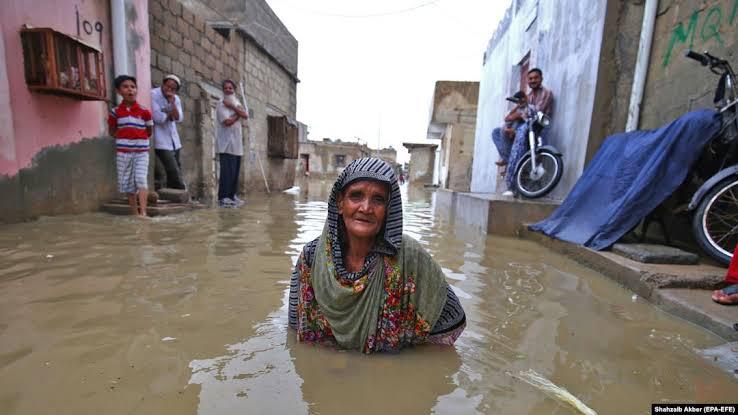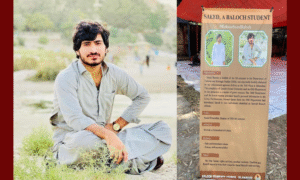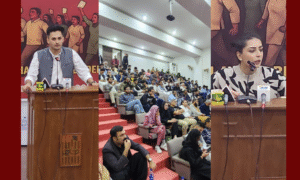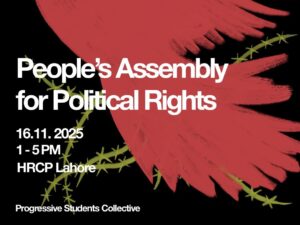Mahnoor Jalal
In the Oscar award winning film Parasite by Bong-Joon-Ho, there’s a short scene which has captured a lot of attention on the discussion surrounding the pandemic and which group faces the greater impact of its implications. The scene is about the driver Ki-taek who is driving the owner Mrs. Park, after a long day of shopping. Mrs. Park is in the back seat having a conversation on the phone with her friend and comments on the rain that took place the previous night, and how it was a blessing. While she says this, the camera focuses on the grim features of Ki-taek, reminding us of the catastrophe the Kim family faced because of the rainfall destroying their home, and forcing them to find refuge elsewhere. The dichotomy that the rainfall had revealed the privilege of the elite and the struggles of the poor is greatly relevant to how in current times, the corona virus pandemic has exposed how institutions have fuelled this divide, particularly with the recent rainfalls in Karachi, which have shown us that simple things such as internet connections or lack of proper infrastructure, fuel the class divide in this country.
Karachi has faced one of the most catastrophic rainfalls, because of which 189 people were reportedly killed and more than thousands of homes were washed away, as according to the country’s National Disaster Management Authority, or NDMA. The damage from these rainfalls has had greater impact over working class communities, where reports emerged of rainwater flooding the streets along with sewage and solid waste, making it difficult for residents to leave their homes and leaving cars abandoned in manholes and ditches. Rainwater damaged the insides of homes as well, and many citizens complained of the prolonged electricity shortage and the lack of supply to clean water, for which they were unable to contact local authorities.
While in the upper class communities such as DHA in Karachi, protests were granted public coverage by the media for the demands they presented to authorities on their mismanagement of planning, it sheds light on the need to focus on the connection between infrastructure and climate change, and which group faces a greater impact. With the pandemic, protests and demonstrations from students and doctors across the country have brought attention to the lack of infrastructure and spending on healthcare and digital technologies, which greatly impacts students from provinces like Balochistan due to lack of internet access or proper digital technologies, which prevents them to attend classes during lockdown. In a similar way, climate change is a working class issue, and the poor infrastructure planning of the state in Karachi has proven become even more ominous as the greater damage of the rainfall focused towards katchi abadis and working class neighborhoods.
In the similar way to the film Parasite where the development of Seoul insured that the rainwater diverts from the upper-class communities and into the homes and basement of working-class residents, the similar observation of the impact of Karachi’s rainfalls can be seen towards how much working class communities have suffered because of poor city planning. Informal settlements or katchi abadis are increasingly susceptible to urban flooding, and residents are left stranded without homes and their furniture after such catastrophes. Which comes to prove that the structural planning in this city was built to fail marginalized communities. Data collected by Sindh Katchi Abadi Authority has reported that there are more than 5,639 slums in Karachi, and the majority of them are built alongside drains. The building of these slums do not involve proper architecture, and rooftops can often collapse and outdoor kitchen arrangements can fall apart. The drains located along side these slums are often ancient or clogged due to sewage disposal as well as lack of development from authorities. Water diverted from these swamps, mixed with sewage can become a breeding ground for diseases, and especially for marginalized communities. Which is why the picture I have posted as the introduction to this article becomes relevant on discussing the link between climate change and infrastructure. For elite communities, home is sanctity from these heavy rainfalls, yet for the majority of the city, home ceased to be a place of safety.
The question then emerges that whether these rainfalls were the result of a natural disaster or a man-made calamity. Was the impact of climate change the result of the ever-lasting damage hit upon the communities of Karachi, or was it the poor city construction by local government officials that resulted in shutting down an entire city, hundreds of people stranded or killed.
Our politicians during this time threw around the phrase “climate change” a lot, which diverts the attention of this event from a much larger issue which was the poor investment of roads and sewerage that might have prevented this catastrophe in the first place. It is quite easy to blame the diminishing ozone layer and humanity’s excessive depletion of CO2 rather than focusing on holding governing authorities accountable for their mistakes. With the similar level of rainfall in the past few years, and environmental experts have already began pointing out how climate change could directly impact Pakistan’s water crisis, with more droughts and increased temperatures likely to reduce water availability, one must become compelled to focus on the systematic ways to tackle this issue.
Bong Joon Ho defines Parasite in a multi-dimensional manner in his film. Each character, whether poor or rich, was guilty of exploiting the other and feeding off their labor. But all of these instances pointed towards the real culprit: the capitalist system. In the same manner, the rainfalls of Karachi, and the covid-19 pandemic, the culprit behind these issues was the state and its apathy towards the working class, designed to fuel the class divide by maligning focus on issues such as infrastructure and urban planning.
The Students’ Herald News Desk focuses on reporting the latest news regarding student politics and campus updates to you.
The News Desk can be reached at admin@thestudentsherald.com




